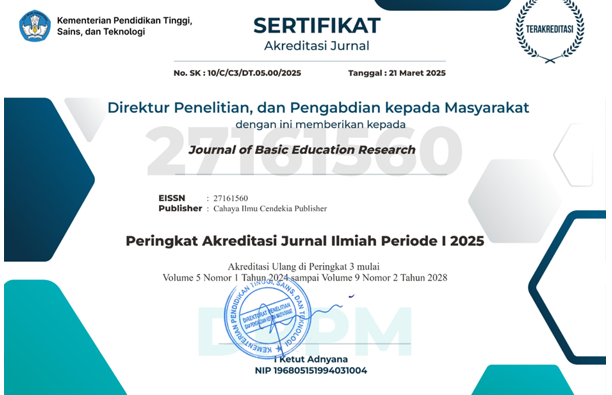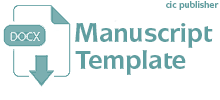Home-Based Learning Activities (H-BLA) In Teaching Physics Topics For Elementary School Students
Abstract
Purpose of the study: This study developed and validated Home-Based Learning Activities (H-BLA) for teaching Physics inspired by the identified Most Essential Learning Competencies (MELCs) by the Department of Education (DepEd). Acknowledging the significance of adaptive and suitable learning materials.
Methodology: The researchers employed the descriptive-developmental method to create and assess the developed home-based learning activities. The Learning Resources Management and Development System (LRMDS) evaluation tool of the Department of Education (DepEd) for printed materials is used and experts agreed that the developed H-BLA met the standards for printed learning materials.
Main Findings: The findings revealed that the level of validity of H-BLA in terms of content, format, accuracy, and up-to-datedness of information of H-BLA was very much acceptable as validated by the experts supported by the result of factors 1, 2, and 4 being very satisfactory. However, the presentation and organization of H-BLA got a "satisfactory" rating.
Novelty/Originality of this study: The study's novelty lies in developing validated Home-Based Learning Activities (H-BLA) for elementary Physics under the K-12 curriculum, utilizing accessible materials to foster independent learning. Grounded in Constructivist Theory, Dale's Cone of Experience, and Contextualized Teaching and Learning, it promotes experiential education. Expert validation and iterative improvement ensure quality, addressing gaps in remote and practical science education
References
A. Haleem, M. Javaid, and R. Vaishya, "Effects of COVID-19 pandemic on daily life," Curr. Med. Res. Pract., vol. 10, no. 2, pp. 78–79, 2020, doi: 10.1016/j.cmrp.2020.03.011.
J. Dsouza, "Based learning 8: HBL — Home-Based Learning," Medium, 2016. Accessed: May 17, 2025.
C. Ambayon, "Modular-based approach and students’ achievement in literature," Int. J. Educ. Lit. Stud., vol. 8, no. 3, pp. 32–36, 2020.
E. Ekici, "Why do i slog through the physics? understanding high school students’ difficulties in learning physics," J. Educ. Learn., vol. 7, no. 7, pp. 102–104, 2016.
M. Camarao and F. Nava, "High school students’ difficulties in physics," ResearchGate, 2017.
G. Rosa, A. de Jesus, M. Antunes, and R. Martins, "Students’ understanding level and scientific literacy competencies related to momentum and impulse," J. Phys.: Conf. Ser., vol. 1097, no. 1, pp. 1–6, 2019, doi: 10.1088/1742-6596/1097/1/012019.
P. Klein et al., "Studying physics during the COVID-19 pandemic: Student assessments of learning achievement, perceived effectiveness of online recitations, and online laboratories," ResearchGate, 2021.
Department of Education (DepEd), PISA 2018 National Report of the Philippines, 2019.
J. Bernardo, "PH ranks last among 58 countries in Grade 4 math, science: study," ABS-CBN News, Dec. 9, 2020.
J. M. Loberes, A. C. Jalmasco, and N. J. Lasala, "Interactive story for teaching ecosystem topics using Twine application for elementary school students: English," J. Basic Educ. Res., vol. 6, no. 2, pp. 66–78, May 2025.
E. T. Koh and W. L. Owen, "Descriptive research and qualitative research," in Introduction to Nutrition and Health Research, Boston, MA: Springer, 2000, doi: 10.1007/978-1-4615-1401-5_12.
R. J. Gestiada, F. J. Tisoy, and N. J. Lasala, "The 360˚ view: Contextualized virtual reality tours as innovative teaching tool in ecology for elementary school students," J. Basic Educ. Res., vol. 6, no. 1, pp. 23–36, Jan. 2025.
World Bank Group, "Module 4 Guiding the Reader: Introductions and Headings," 2014.
M. Rathi, "Enhancing learning outcomes with the introduction of teaching-learning material," Lead School, 2023.
C. Mursky, "Pre-Assessment," 2011.
R. B. Orr, M. M. Csikari, S. Freeman, and M. C. Rodriguez, "Writing and using learning objectives," CBE Life Sci. Educ., vol. 21, no. 3, Article fe3, Sep. 2022, doi: 10.1187/cbe.22-04-0073.
S. Richter, "Learning tasks," in Encyclopedia of the Sciences of Learning, N. M. Seel, Ed. Boston, MA: Springer, 2012, doi: 10.1007/978-1-4419-1428-6_342.
Bradford Research School, "Elaboration: an effective strategy for learning," 2018.
M. Bartek, "60 science trivia facts to spark student curiosity," We Are Teachers, 2023.
N. J. Lasala, "Development and validation of E-SelfIMo: E-learning self-directed interactive module in Earth Science," Recoletos Multidiscip. Res. J., vol. 11, no. 1, pp. 85–101, 2023, doi: 10.32871/rmrj2311.01.07.
Z. Tindall, "5 major benefits of using videos in education," Learning Today, 2024.
S. Shinde, "Importance of evaluation in teaching learning process," Scholarly Res. J. Humanit. Sci. Eng. Lang., vol. 10, pp. 13520–13529, 2022.
A. Love, "Understanding approaches to evaluation," in Int. Encycl. Educ., 3rd ed., Elsevier, 2010, pp. 798–807, doi: 10.1016/B978-0-08-044894-7.01594-3.
N. Lasala Jr., "Effects of game-based activities on students' social skills and attitudes toward learning science," Recoletos Multidiscip. Res. J., vol. 12, no. 1, Jun. 2024. doi:10.32871/rmrj2412.01.14.
S. McKenny, S. Voogt, J. Pieters, and B. Nieveen, "Teacher design knowledge for technology enhanced learning: An ecological framework for investigating assets and needs," Springer, 2015.
B. Oladunjoye and T. Oyetunde, "How outdated academic materials affect quality of tertiary education," Wanadata Africa, 2018.
H. I. Saglam, "An investigation on teaching materials used in social studies lesson," Turk. Online J. Educ. Technol., vol. 10, no. 1, pp. 36–44, 2011.
COMET Program, "Part 1: The instructional role of illustrations," 2015.
D. Zufic, "More efficient e-learning through design: Color of text and background," Proc. World Conf. E-Learn. Corp. Gov. Healthc. High. Educ. (ELEARN), 2009.
M. Theall, "Related course material to real-life situations," 2012.
Adelphi University, "Writing module-based learning objectives," 2021.
R. Rogayan Jr. and R. Dollete, "Development and validation of physical science workbook for senior high school," Sci. Educ. Int., vol. 30, no. 4, pp. 362–369, 2019. doi: 10.33828/sei.v30.i4.5.
M. Ulit, "Writing errors of grade nine students: Basis for sentence writing modules," Asian Soc. Teach. Res. Inc., 2018.
S. Yitbarek, "Low-cost apparatus from locally available materials for teaching-learning science," Afr. J. Chem. Educ., vol. 2, no. 1, pp. 32–47, 2012, doi: 10.4314/ajce.v2i1.82438.
Copyright (c) 2025 Robert Candia, Gladys Glomar , Camele Joven , Nestor Jr Lasala

This work is licensed under a Creative Commons Attribution 4.0 International License.
Authors who publish with this journal agree to the following terms:
- Authors retain copyright and acknowledge that the Journal of Basic Education Research is the first publisher licensed under a Creative Commons Attribution 4.0 International License.
- Authors are able to enter into separate, additional contractual arrangements for the non-exclusive distribution of the journal's published version of the work (e.g., post it to an institutional repository or publish it in a book), with an acknowledgment of its initial publication in this journal.
- Authors are permitted and encouraged to post their work online (e.g., in institutional repositories or on their website) prior to and during the submission process, as it can lead to productive exchanges and earlier and greater citation of published work.





.png)


.png)
.png)


















